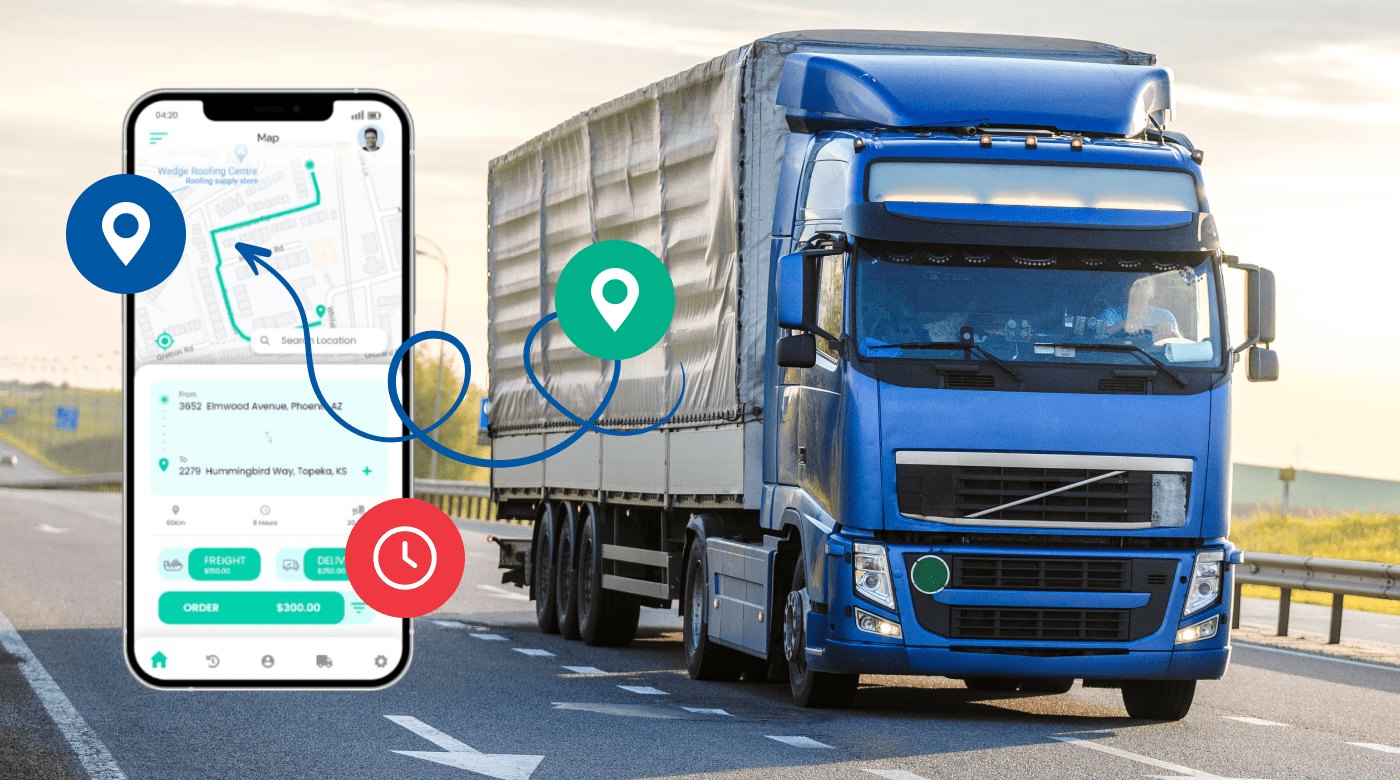Optimizing your supply chain is a tricky game.
There are factors beyond your control, and shipping delays almost seem inevitable. As the world and economy change, businesses must quickly adapt to ensure that shipping timelines are met and that delivery prices don’t exceed projections.
To accomplish this, many enterprise companies use a transportation management system.
In this post, we’ll look at a few of the top transportation management systems and share the benefits of implementing one. But before we do, let’s define transportation management systems and explain how they work.
What is a transportation management system?
Customers sometimes take for granted the logistics that go into getting a package delivered to their doorstep. The product needs to be sourced and shipped — sometimes across an ocean by boat or in the air by plane. Then, it needs to be transported directly to the customer’s doorstep — while providing total visibility to both the customer and the company.
A transportation management system can simplify this complicated process, making it a vital part of the supply chain. It enables businesses to plan, track and oversee the shipment of goods.
Think of a transportation management system as the nucleus of your shipping protocols; it’s the central point that serves as critical infrastructure and oversees everything related to your transportation and delivery process.
Some of the aspects that transportation management systems control include cost oversight, compliance, and delivery timelines.
Transportation management systems help businesses optimize their shipping procedures and ensure they’re managing the entire process efficiently. The best transportation management systems provide enterprise business owners with a holistic view of the production and shipping process from start to finish.
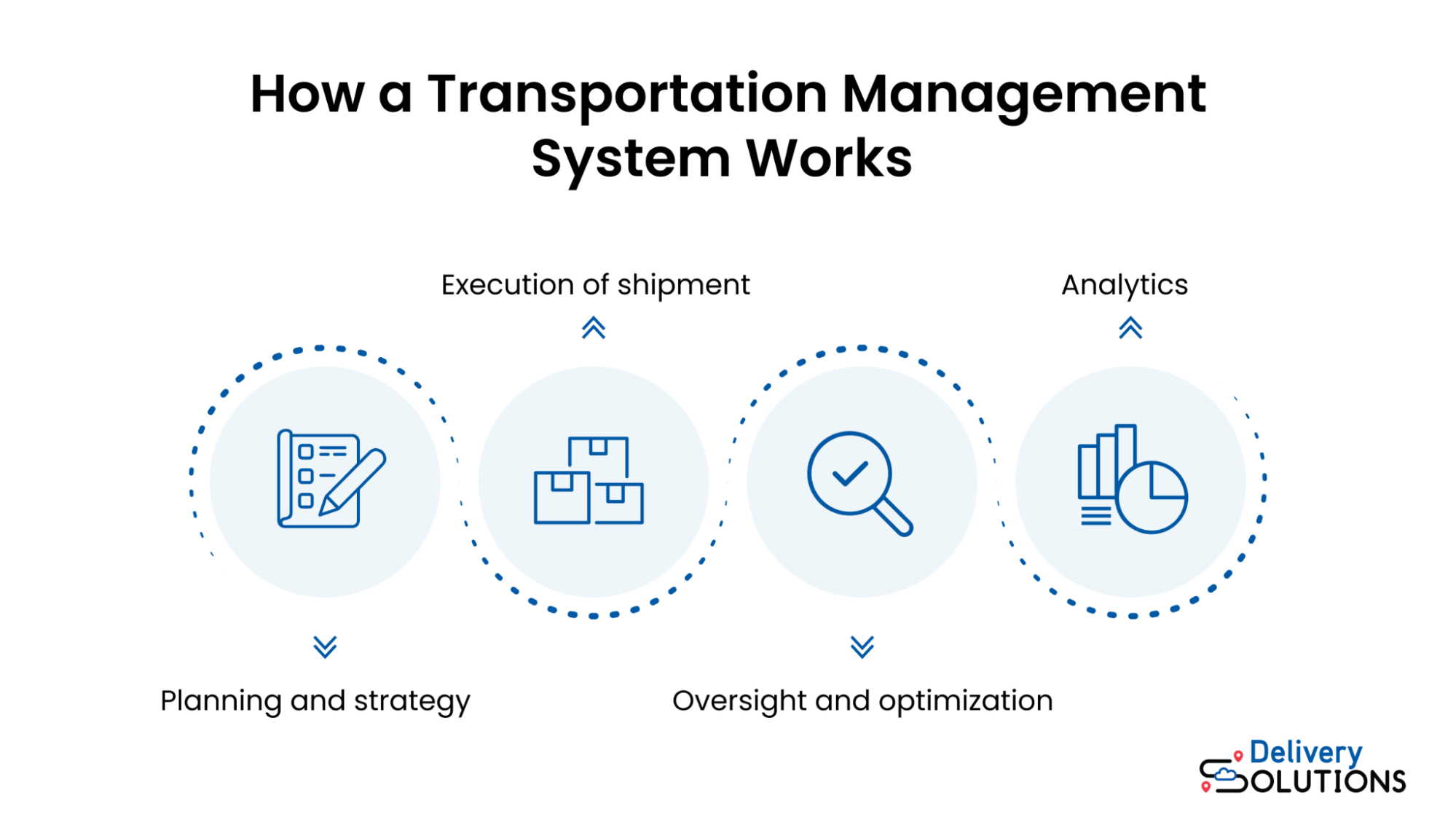
Businesses spend a lot of money trying to optimize and eliminate redundancies in their supply chain and shipping processes.
With so many parcels being shipped every day, even the smallest cost savings can add up for a business. That’s why investing in the right transportation management solution can pay off in the long run.
The international transportation management market is expected to grow to $11.4 billion by 2027.
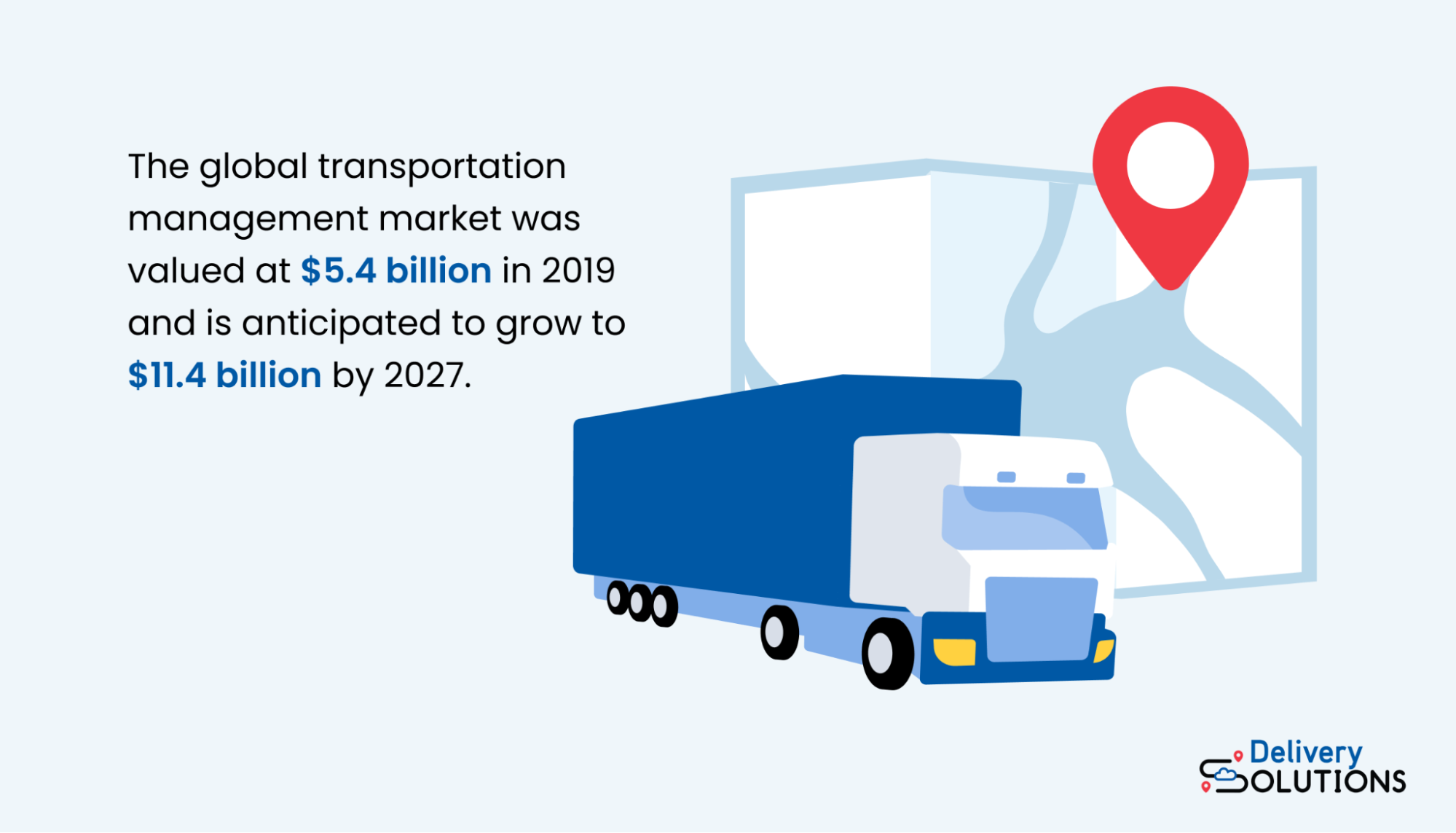
With the right transportation management system in place, businesses can cut down on redundant costs and inefficiencies in their supply chain, positively impacting their bottom line.
Now, you might be wondering, “Couldn’t I manage this process with various software providers and team members reviewing our systems? Why would I need a comprehensive transportation management system?”
Having a single platform for load planning, shipment tracking, anticipated delivery times, and more is invaluable. A transportation network that can make accurate predictions on a regular basis enables operators to make continuous improvements to their transportation processes.
Let’s take a look at some of the benefits of a comprehensive transportation management system for enterprise businesses.
Although it isn’t required for every business, most enterprise businesses eagerly seek out a transportation management system to aid in their transportation operations.
The benefits of a transportation management system
The complexity of supply chains and delivery systems has made transportation management systems a necessity for enterprise businesses.
But what exactly do transportation management systems do? And why should you implement one in your business?
There are numerous problems that a transportation management system can solve. It can perform various functions, including planning, freight management, execution, and administration.
Planning consists of the optimization of routes and carriers. Operators can look at the reporting analytics to decide how to make adjustments to the process.
Freight management pertains to carrier rates, contracts, and order management.
The execution phase refers to the booking and tracking of the freight — with visibility over where everything is at any point in time.
Finally, administration typically focuses on billing, payment, settlement, and auditing.
Operators can use these core functions to enhance their transportation efforts from the moment an order is placed to the minute it’s delivered to a customer’s doorstep.
There are numerous benefits of implementing a transportation management system into your business.
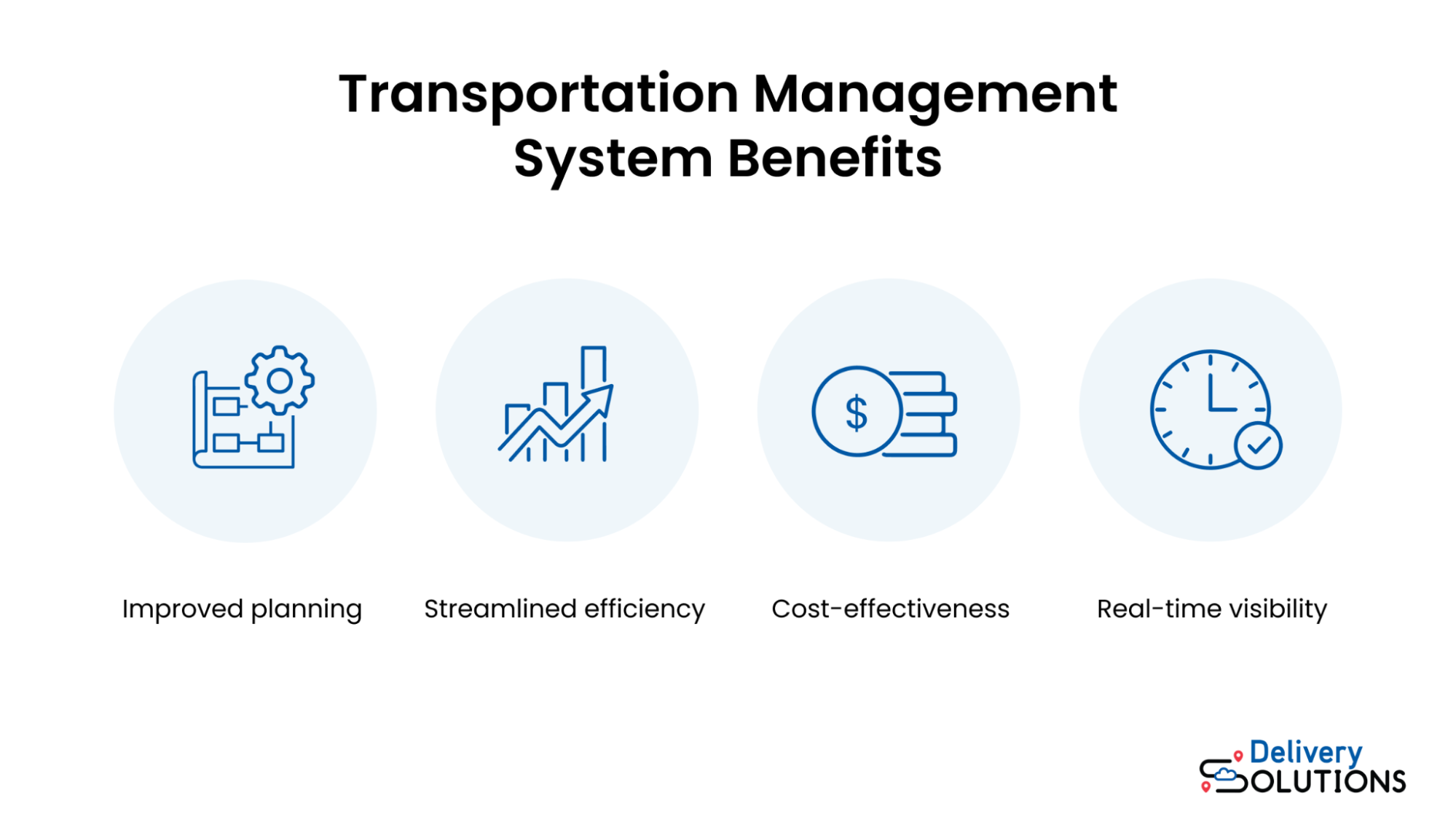
Some of the top benefits of transportation management systems include:
- Improved planning: Optimization and forecasting can help enterprise businesses avoid obstacles, while the analytics and built-in reporting measures in transportation management systems can provide up-to-date information to avoid issues.
- Streamlined efficiency: Employees will save time by having all orders and existing contracts streamlined in one place for easy review. In just a few clicks, you’ll be able to retrieve the information you need and be back to working on more pressing matters.
- Cost-effectiveness: Enterprise businesses can better track the billing and settlement process and ensure they are getting paid what they are owed on time. You don’t have to worry about bills falling through the cracks with a transportation management system.
- Real-time visibility: Having a comprehensive view of the entire transportation process is invaluable to operations teams. You’ll be able to assign different access controls to different employees, making sure each operator is able to optimize your transportation planning and execution.
Most importantly, though, transportation management systems can supercharge a business’s efficiency and impact its bottom line. Everything comes back to the money that businesses save by integrating a transportation management system into their operations.
Implementing one is a critical decision that a business must make. In fact, it could transform the business’ entire supply chain operation.
But how do you know which transportation management system is right for your company?
It begins with an assessment of your company’s needs and an evaluation of the transportation management systems currently in the market.
5 transportation management systems to review
There are many transportation management systems on the market. Where should you start in your review?
Let’s take a look at a few of the leading ones on the market today to help you figure out which one might be a good fit for your business operations.
1. Delivery Solutions
Delivery Solutions can serve as your transportation management system with their innovative fulfillment, delivery, and post-purchase offerings.
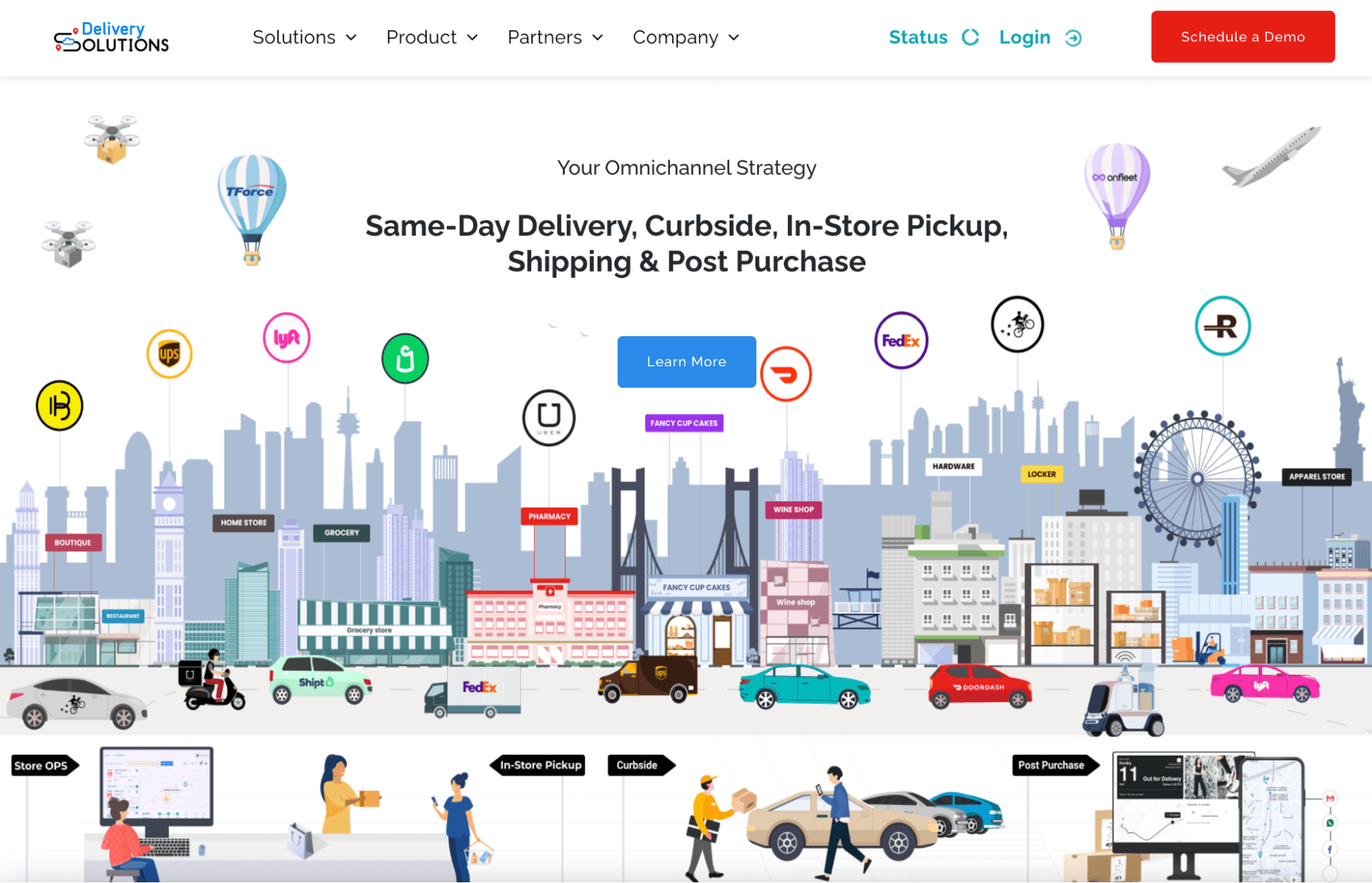
We are proficient in enhancing the same-day, curbside, in-store pick-up, and shipping processes while offering innovative post-purchase functionality that enterprise businesses need in their checkout processes.
The best part, though, is our integrated access to the world’s leading delivery providers, which provides you with the ability to enhance your omnichannel strategy across all popular demand channels.
Schedule a demo today to see how Deliver Solutions can enhance your delivery and shipping process from start to finish.
2. BlueYonder
BlueYonder is a leading transportation management system that offers enterprise clients a comprehensive view of their supply chain and delivery logistics.
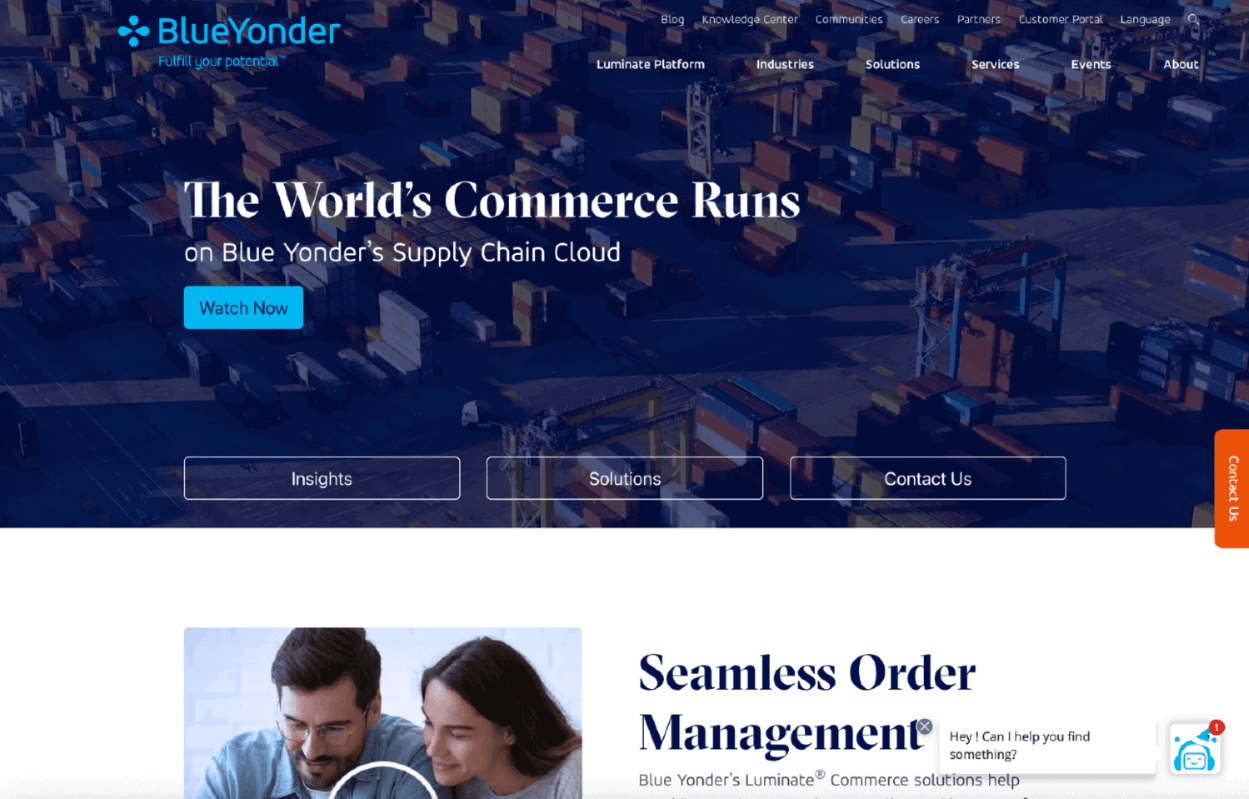
BlueYonder’s partnership with Delivery Solutions makes this system a seamless way to enhance and oversee your entire delivery and logistics process.
BlueYonder believes that its transportation management solution will have a profound impact on your bottom line. It boasts that clients have realized an average of 5% less in administrative costs, 8% less in overall costs, and a 40% improvement in service levels.
This system offers benefits for both transportation planners and executives.
Transportation planners will find value in the improved visibility they have over the transportation process, automated AI-assisted actions, dynamic routes, and rates to keep much-needed flexibility infused in the delivery process.
Transportation executives will be impressed by the company’s optimized operations, its reduction in overarching transportation costs, and the integrated ecosystem that is connected through the software.
3. Manhattan Active Solutions
Manhattan Active Solutions promises enterprise clients a seamlessly interconnected, current and adaptive infrastructure with their transportation management technology.
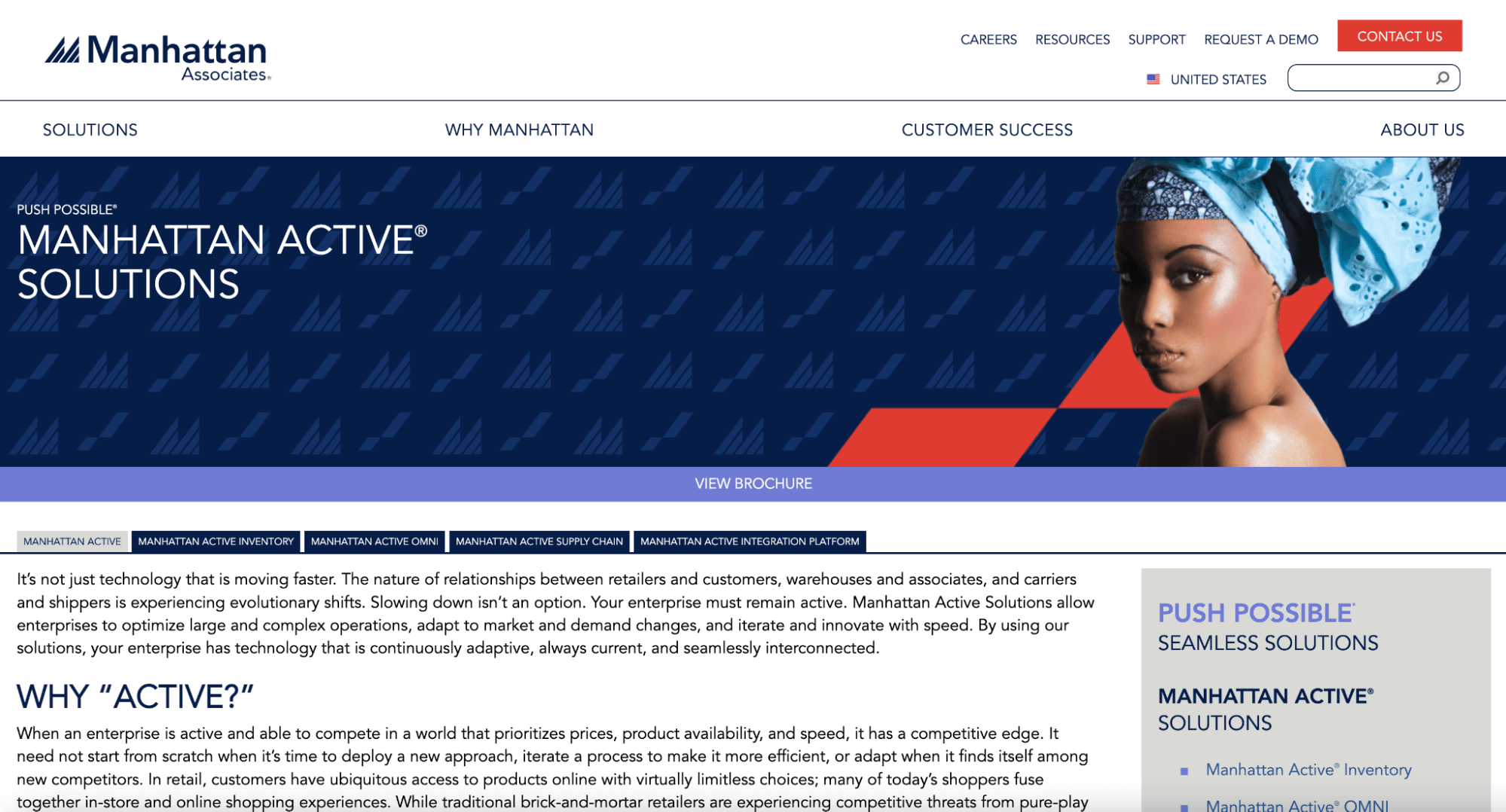
Manhattan Active Solutions offers three products:
- Manhattan Active Inventory: A cloud architecture solution that enables clients to “improve service levels, grow sales, and optimize inventory.”
- Manhattan Active OMNI: A commerce solution that connects the in-store and online experience with the rest of the supply chain and delivery process.
- Manhattan Active Supply Chain: Software that enables businesses to optimize their supply chain and oversee shipping activity in real time.
All of these products come together to create a comprehensive transportation management solution for enterprise businesses.
4. Oracle Transportation Management
Oracle Transportation Management is another major transportation management solution on the market. This system helps enterprise companies manage their transportation operations across the globe.
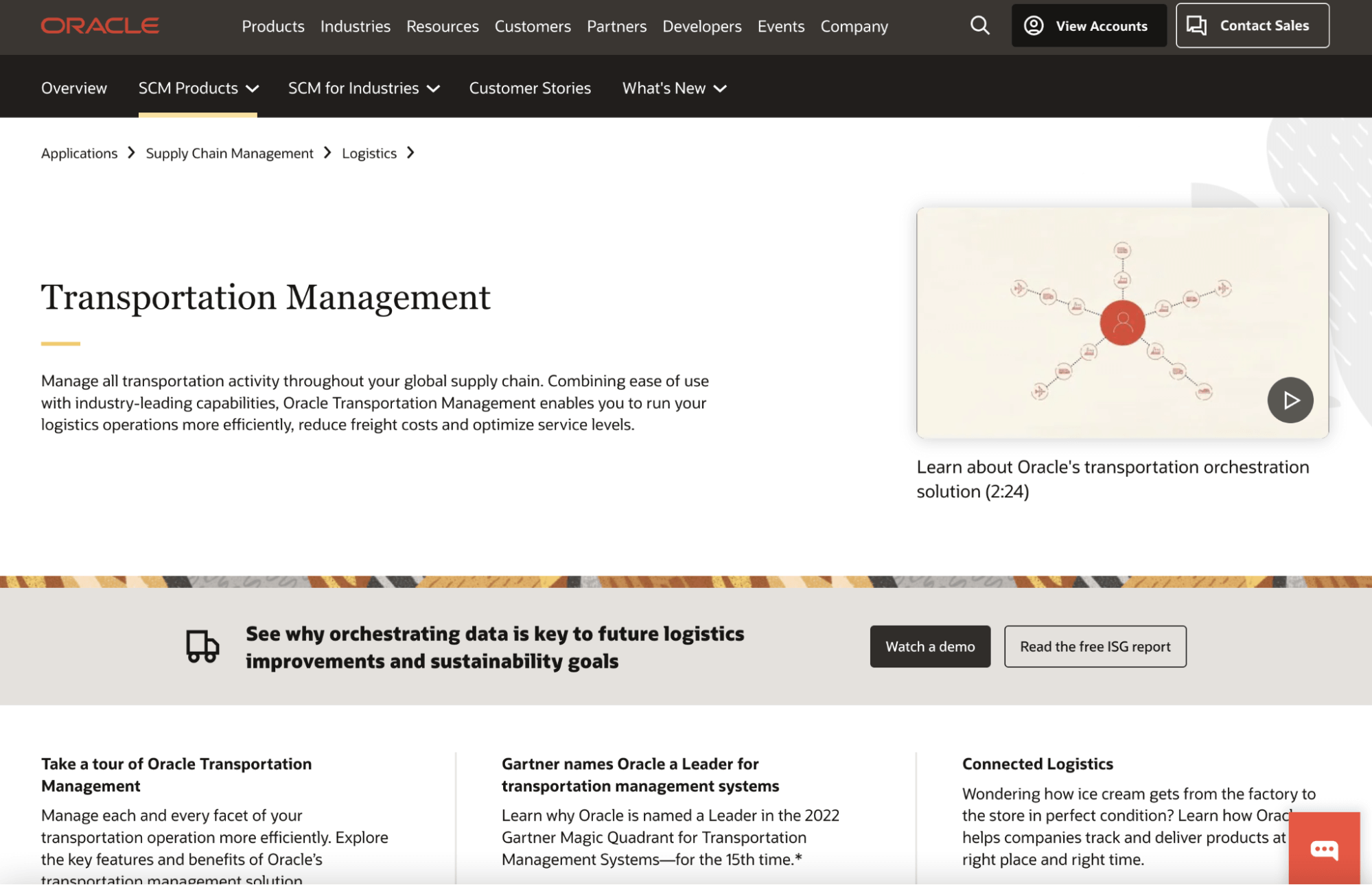
Oracle Transportation Management can work with a variety of goods and many different modes of transportation. It tracks and optimizes outbound goods, inbound supplies, general shipments, customer returns, and more. In addition, it manages all transportation types — road, air, ocean, and rail — both in the US and around the world.
Enterprise businesses love Oracle Transportation Management because the solution provides both order management integrations and rate management, so you can keep all supplier, vendor, and service manager contracts in one place for easy access.
Oracle Transportation Management gives operators a chance to execute precision operational planning across their entire supply chain and shipping logistics. You can incorporate rules and specific logic to optimize shipments and orders in real time. This enables businesses to plan accurately for sourcing, routing, fleet management, and more.
5. SAP Transportation Management
SAP Transportation Management is another transportation management system that focuses on “visibility and control to optimize logistics and improve services.”
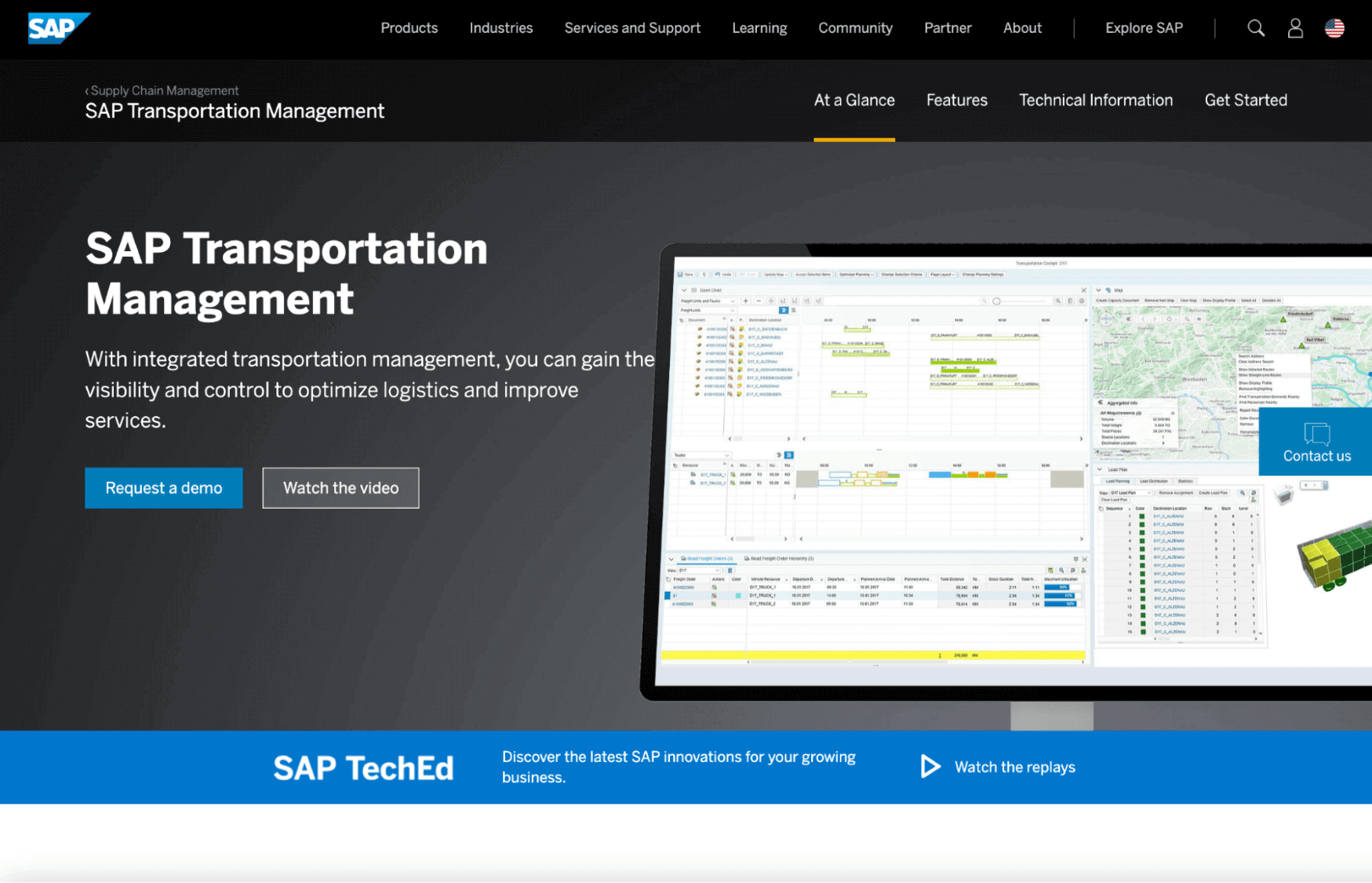
A major design priority was to make the platform simple and easy to use. SAP Transportation Management is invested in “reducing transportation complexity dramatically” for enterprise clients around the world.
To achieve this, they offer a variety of features and functionalities. Some of the most popular are transportation planning, interactive flight tendering, and on-premise and cloud deployment to enable a wide variety of use cases.
As one of the leading transportation management systems in the market, consider SAP Transportation Management to see how it could improve your business.
6. MercuryGate
MecuryGate prides itself on the wide array of companies it has helped over the years. This transportation management platform highlights prominently on the site that MercuryGate’s technology has 78 billion freight under management and executed 120 million loads last year.
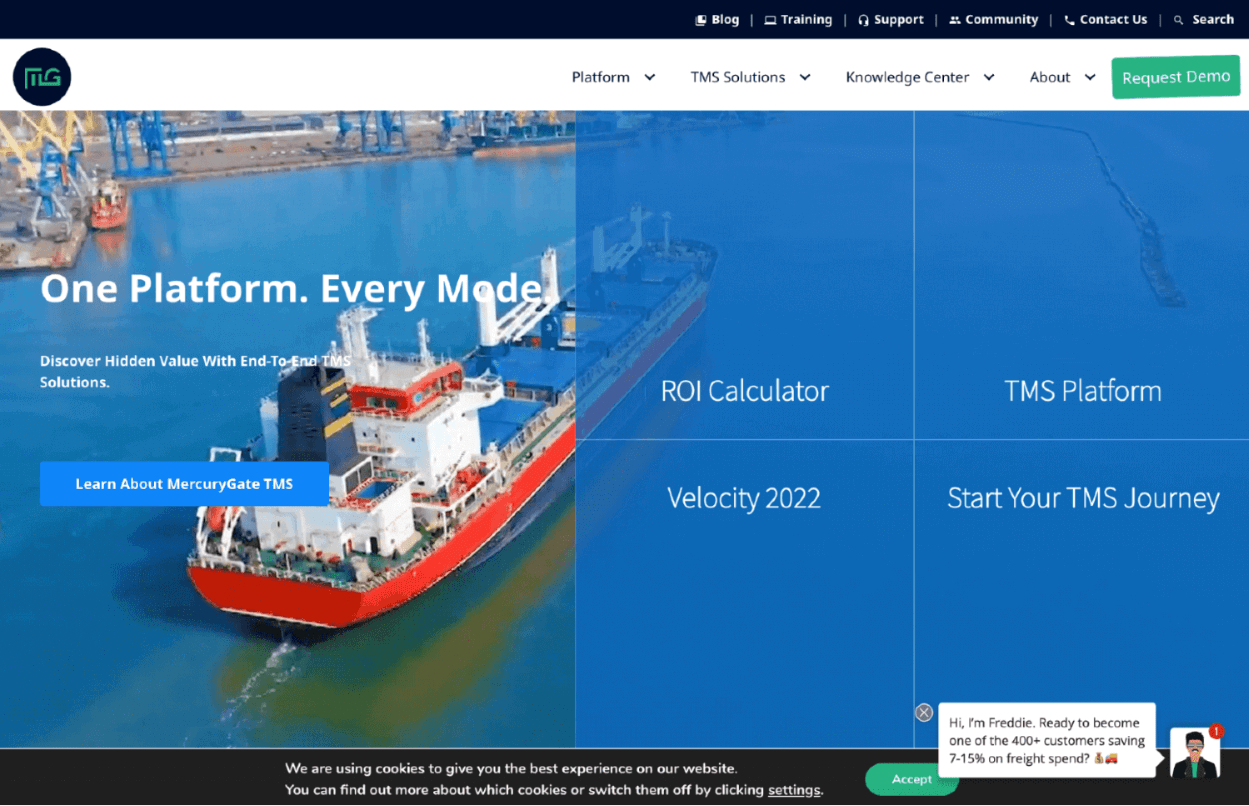
In addition, they offer more than 100,000 connections to carriers, which will be a point of interest for companies looking for an all-encompassing solution with various delivery options.
MercuryGate works closely with 3PLS, shippers, brokers, and carriers while automating businesses’ entire transportation processes. It’s a simple, point-and-click interface with customizable modules that make it easy for clients to optimize costs and shipping workflows.
One MercuryGate product to point out is its Smart Transportation suite. This transportation management suite unifies and analyzes data for customers, making it actionable and useful for businesses looking to enhance their transportation processes.
3 factors to consider when selecting your transportation management system
There are plenty of great transportation management systems in the market today. But how do you know which system is the ideal fit for your business?
There are a few factors to consider when selecting a transportation management solution.
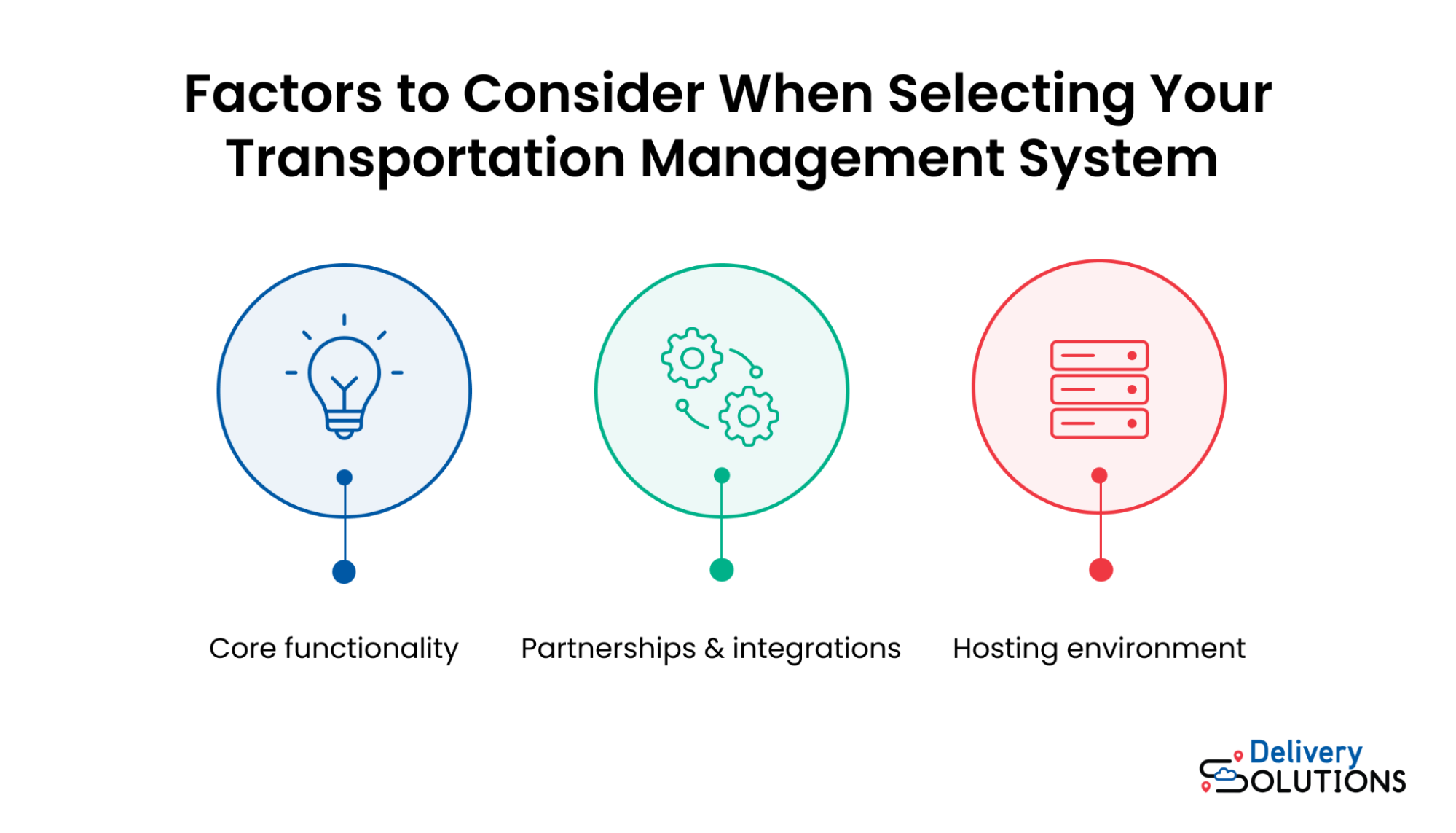
These include:
- Core functionality: Does the transportation management system address the majority of your pain points? This is likely the most pressing stage of the evaluation process. If the transportation management system doesn’t do what you need it to do out of the gate, then consider other options.
- Partnerships and integrations: You’ll need to connect your transportation management system to a last mile aggregator. To do this, you should make sure your system has the right integrations in place and an API that can connect to another software. Delivery Solutions’ API can connect seamlessly to many transportation management systems.
- Hosting environment: Are the transportation management systems cloud-based, or do they use local storage? Cloud-based systems can provide more scaling flexibility, while local storage can get expensive.
Selecting the right transportation management system is a major business decision.
While there may be more than one that fits your business needs, it’s important to evaluate each carefully. The wrong selection can disrupt your transportation process and be costly to overcome.
Conclusion
Implementing a transportation management solution can help ease some of your supply chain’s inefficiencies while providing more visibility and improving your bottom line.
However, you must also use the right last mile provider to ensure that your deliveries get to their final destinations within the right time frames. Delivery Solutions integrates with many transportation management systems to provide a cost-effective and efficient way to streamline your delivery process.
Schedule a demo to learn how Delivery Solutions can improve your last mile delivery operations and increase customer satisfaction.
Delivery Solutions orchestrates fulfillment experiences for enterprise retailers, supplying flexible optionality for consumers and priming merchants for innovation at scale.
Ryan Caldarone
Ryan is a Sr. Digital Marketing Manager with over ten years of experience in B2B eCommerce, specializing in brand storytelling and content. Having contributed to hundreds of creative projects for SMBs and startups across the tech, energy, and fine arts sectors, Ryan brings diverse perspectives.
Topics from this blog: Delivery Improvement Efficiency
